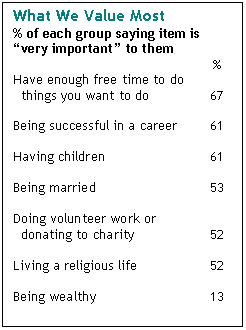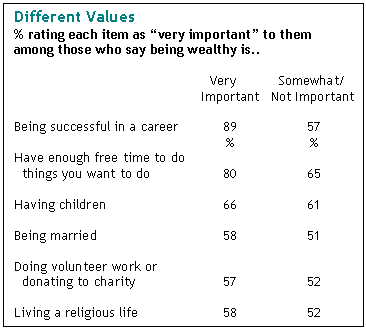Who says Americans worship at the feet of the almighty dollar? Not the American public. Only 13% of adults say it’s “very important” for them to be wealthy, ranking this personal priority far behind six others measured in a new survey by the Pew Research Center Social & Demographic Trends project.
 But don’t get Americans wrong — a majority certainly wouldn’t mind being rich. According to the survey, another 43% of adults say being wealthy is “somewhat important” to them, while about the same proportion say it’s “not too important” (33%) or “not important at all” (10%).
But don’t get Americans wrong — a majority certainly wouldn’t mind being rich. According to the survey, another 43% of adults say being wealthy is “somewhat important” to them, while about the same proportion say it’s “not too important” (33%) or “not important at all” (10%).
These survey findings cannot answer whether most Americans genuinely place a medium-to-low value on wealth, or whether they accept the fact that they’ll never be rich, or whether they’re reluctant to admit that money matters a lot to them. But whatever the explanation, it’s striking how few Americans rank being wealthy as a top priority in their lives.
Four times more people say “doing volunteer work or donating to charity” is a very important priority than say the same about being wealthy (52% vs. 13%). And about five times more Americans (67%) say it’s very important to them to have enough free time, the top-rated value in this survey, which was conducted by telephone from Jan. 24 through Feb. 19, 2008 among a nationally representative sample of 2,413 adults.
Who most wants to be rich? Those who aren’t, this survey suggests. Fully 22% of those with family incomes of less than $20,000 a year say it’s “very important” for them to be wealthy. That’s more than double the proportion of adults who earn $100,000 or more a year.
Paradoxically, while the least affluent are the most likely to value wealth the most, they’re also among the most likely to value wealth the least. Fully 13% of those in the less-than $20,000 income category say becoming wealth is “not important at all” to them, nearly double the proportion of those in the $100,000 or more category who hold this view. As it turns out, there’s an age-related explanation for these seemingly inconsistent results. Those in the lowest income tier contain disproportionately large numbers of adults under the age of 30, a group that most values wealth, but also a heavy share of retirement-age adults, a group that values wealth the least.
These data also reveal another intriguing paradox. When the analysis is expanded to include those who say being wealthy is at least “somewhat important” to them, affluent Americans emerge as the group that is most likely to say they place at least some importance on wealth — even though they are less likely than the least affluent adults to rank it as a very important priority. Nearly six-in-ten (56%) Americans earning $100,000 or more say they somewhat value wealth, compared with 35% of those making $20,000 or less. When those results are combined with the proportions who say being rich is very important to them, nearly two-thirds of the most affluent (65%) value wealth, compared with 57% of those who currently earned the least.
Who Most Values Wealth
Wealth holds a great attraction for the young, this survey finds. Fully 20% of all adults under age 30 say being wealthy is a top priority — easily the largest proportion of any age group. Another 42% say it’s at least somewhat important to them. But the dream apparently diminishes with age. Only about 14% of adults between the ages of 30 and 49 place a high premium on being wealthy. And by the time adults reach their 50s, just one-in-ten place a similarly high priority on riches.
Minorities also are significantly more likely than whites to value wealth. More than a quarter (26%) of all blacks says that it’s very important to them to be rich, nearly three times the proportion of whites (9%). Hispanics are more than twice as likely as whites to rate wealth as a top priority (21% vs. 9%). Overall, first-generation Americans are twice as likely as subsequent generations to say it’s important to them to be rich (25% vs. 12%).
Education follows a similar pattern, with those with a high school education or less significantly more likely than college graduates to value wealth (18% vs. 7%) and somewhat more likely to say riches aren’t a personal goal at all (6% vs. 10%).
Being wealthy tends to be highly valued by many whose current circumstances suggest they face long odds of ever becoming well-off including unemployed men as well as the least well-educated. About a quarter of each group say being rich is very important to them. For many of these Americans, this expressed desire for wealth may reflect little more than the desire to be financially more secure.
Other Priorities
 The Want-to-Be-Rich are different from you and me (at least the majority of yous and mes) as measured by some of the values they tend to hold. These Americans rank career success at the top of their priorities list: Nearly nine-in-ten (89%) say it’s “very important” for them to succeed on the job compared with only 57% of Americans who don’t say wealth is very important. Those in the latter group place career success third on their ranking of important values behind having enough free time (65%) and having children (61%).
The Want-to-Be-Rich are different from you and me (at least the majority of yous and mes) as measured by some of the values they tend to hold. These Americans rank career success at the top of their priorities list: Nearly nine-in-ten (89%) say it’s “very important” for them to succeed on the job compared with only 57% of Americans who don’t say wealth is very important. Those in the latter group place career success third on their ranking of important values behind having enough free time (65%) and having children (61%).
That’s not to say Americans who want to be rich are careerists who place little value on free time. Just the opposite: They’re much more likely than others to say they want to have time to do the things they enjoy doing (80% vs. 65%); it’s just they don’t rate free time as highly as job success. In fact, those who wanted to be wealthy were more likely to value each of the six other values tested, though these differences were slightly too small to be statistically significant on all priorities except career success and having free time.


